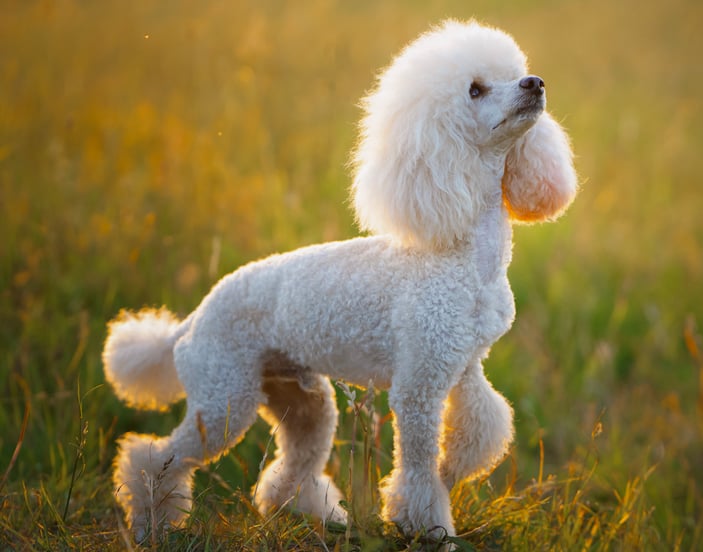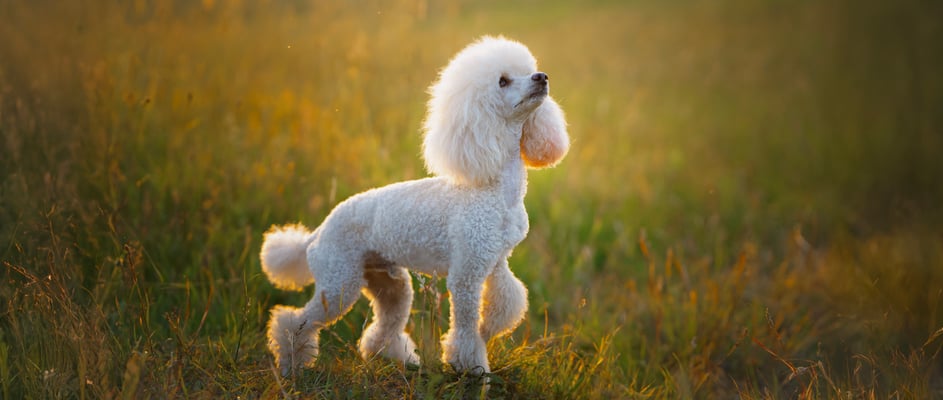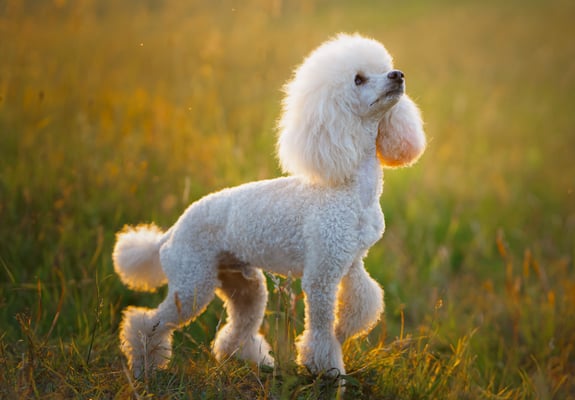The guide to owning a Poodle.
Want to know everything there is to know about training your Poodle puppy? Submit your email below, and we’ll send you a one-stop guide on all things puppy training!
Jump to:
Stats at a glance.
History of the Poodle.
While many think of Poodles as the quintessential French dog, these clever canines actually originated in Germany, where they were known as "Pudelhund" - literally meaning "water dog."
Poodles were originally brave water retrievers, so don't let those fancy haircuts fool you. They helped hunters collect waterfowl with remarkable skill.
Speaking of those distinctive haircuts - there's more to the Poodle clip than meets the eye!
Those pompoms weren't just for show. Hunters strategically trimmed their Poodles to protect vital organs and joints while keeping them agile in the water. The signature pompoms helped keep their joints warm during chilly water retrievals.
These versatile dogs eventually caught the eye of French nobility, where they became beloved companions and the country's national dog.
Their incredible intelligence and adaptability helped them excel in various roles, from circus performers to truffle hunters.
Today's Poodles come in three delightful sizes - Standard, Miniature, and Toy - each with identical breed standards except for height, showcasing the versatility of the Poodle dog breed.
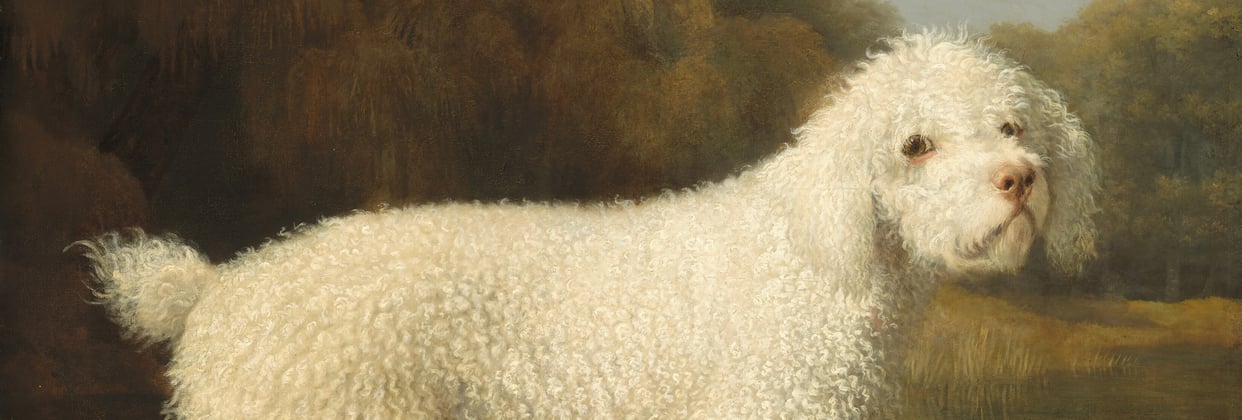

How much is a Poodle puppy (UK)?
Looking to welcome a Poodle into your family? Let's talk about what you can expect to invest in your new furry friend. While prices vary based on factors like size, colour, and pedigree, here's a general guide:
Toy Poodles: £500-£3,000
Miniature Poodles are a great choice for pet parents looking for a smaller companion. £750-£2,500
Standard Poodles: £700-£1500
If you're wondering about how these prices compare to other breeds, you might be interested in our guide to the UK's most expensive dog breeds.
A word of wisdom - when searching for your perfect Poodle puppy, focus on finding a reputable breeder who prioritises health testing rather than looking for the lowest price, especially for toy and miniature varieties.
A good breeder will provide health certificates for both parent dogs and ensure proper early socialisation.
Not sure what to look for? Check out our comprehensive guide to buying a puppy.
Colours and coat types.
Poodle colours
One of the most delightful things about Poodles is their stunning variety of colours. You'll find them in:
Solid colours:
Black - the classic look of Poodles that has been associated with France for generations.
White - pristine and elegant
Brown - rich and warm
Red - vibrant and eye-catching
Apricot - soft and subtle
Cream - gentle and refined
Silver - sophisticated and unique
Parti colours (two or more colours):
Black and white
Brown and white
Apricot and white
Coat types
Here's something special about Poodles - they're one of the few breeds considered hypoallergenic, making them a fantastic choice for allergy sufferers!
Their single-layer coat is more like human hair than typical dog fur, and it grows continuously.
While there's only one type of Poodle coat, it can be styled in various elegant clips such as:
Puppy clip - adorable and low-maintenance
Continental clip - the classic show-dog style
English saddle clip - sophisticated and balanced
Sporting clip - practical and neat
Modern clip - contemporary and stylish
Looking for more breeds that might be suitable for allergy sufferers? Check out our complete guide to low-shedding dogs.





Size and weight.
Let's talk about what size Poodle might be perfect for your lifestyle, especially if you’re looking for a dog that is suited to a variety of living situations and one which thrives on positive reinforcement.
This beautiful breed comes in three distinct sizes, each with their own charm:
Standard Poodles:
Height: 45-60cm (over 15 inches) at the shoulder.
Weight: 20-32kg (45-70 pounds). Think of them as the gentle giants of the Poodle world - graceful and athletic, yet substantial enough for any family activity.
Miniature Poodles:
Height: 28-35cm (10-15 inches) at the shoulder.
Weight: 5-8kg (12-17 pounds) The perfect "middle ground" option, combining the Standard's dignity with a more compact size.
Toy Poodles:
Height: 24-28cm (under 10 inches) at the shoulder.
Weight: 3-4 kg (6-9 pounds). These pocket-sized pups pack all the Poodle personality into a tiny, adorable package!
If you're weighing up different dog sizes, take a look at our guide to the top small dog breeds to help make your decision.
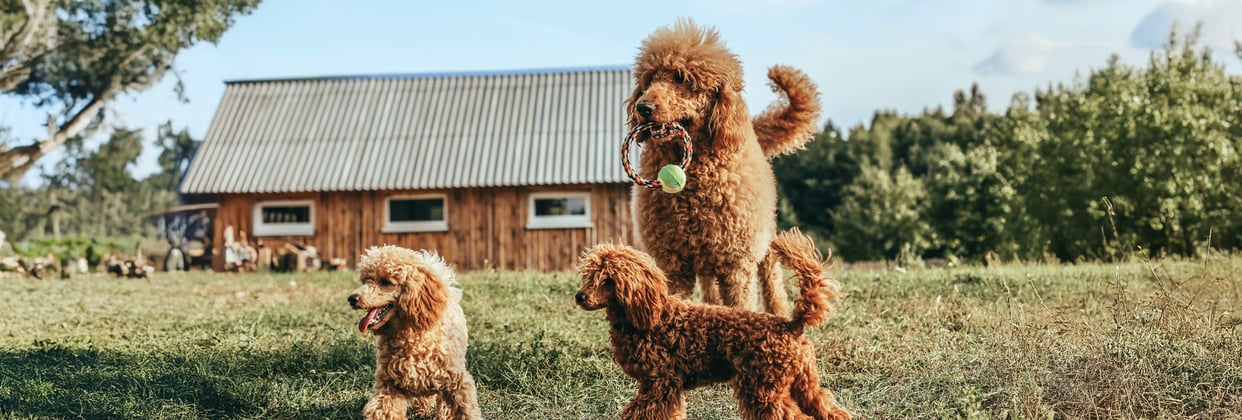

Temperament and behaviour.
Poodles are the valedictorians of the dog world - consistently ranking among the brightest breeds with their exceptional intelligence and dignified demeanour.
Wondering how they compare to other clever canines? Check out our list of the smartest dog breeds.
Do Poodles make good pets?
Absolutely! These versatile dogs shine as family companions thanks to:
Remarkable intelligence
Eager-to-please attitude
Adaptable nature
Affectionate personality
Are Poodles good family dogs?
If you're looking for a family-friendly pup, Poodles tick all the boxes. They're patient with children, naturally protective, and adapt beautifully to family life.
For more great family dog options, explore our complete guide to the best family dogs in the UK.
Are Poodles good with cats and other pets?
Here's good news for multi-pet households: Poodles typically get along wonderfully with other animals when properly socialised.
Their intelligence helps them understand appropriate behaviour around other pets, making them excellent additions to homes with existing furry family members.


Behaviour
Let's chat about what living with a Poodle is really like. These sophisticated pups have some interesting quirks and traits worth knowing about!
Do Poodles suffer from separation anxiety?
Like many intelligent breeds, Poodles form incredibly strong bonds with their families. While this makes them wonderfully devoted companions, it also means they can struggle when left alone for too long.
If you're concerned about separation anxiety, our guide to managing separation anxiety in dogs offers practical solutions to help your pup feel more secure.
Can Poodles be left alone?
While every dog is different, most Poodles prefer not to spend more than 4-6 hours alone. They're social butterflies who thrive on human companionship! Consider arranging a dog walker or pet sitter if you need to be away longer - your Poodle will thank you for it.
Training a Poodle.
Are Poodles smart?
Poodles consistently rank in the top three most intelligent dog breeds worldwide! This impressive brainpower means they:
Pick up new commands in a flash
Love solving puzzles and problems
Excel at training activities
Understand complex instructions
Are Poodles easy to train?
Thanks to their remarkable intelligence and eager-to-please nature, Poodles are a dream to train, especially in obedience training. They excel in:
Basic obedience
Agility sports
Trick training
Therapy work
However, remember that all that brainpower needs direction! A bored Poodle can get creative with entertainment, so keeping training sessions fun and engaging is key.


Grooming and maintenance.
Let's talk about keeping your Poodle looking and feeling their best. While their gorgeous coats do need regular attention, don't let that intimidate you - we'll break it down into manageable steps.
How often should I brush my Poodle?
Think of daily brushing as your special bonding time with your Poodle. Their continuously growing, curly hair needs regular attention to prevent those pesky mats from forming.
Here's a pro tip: Use a slicker brush followed by a metal comb, paying extra attention to those easily-tangled spots behind the ears and under the legs. Your Poodle will thank you with a lifetime of cuddles.
How often should I bathe my Poodle?
Most Poodles need a bath every 3-6 weeks, depending on their lifestyle (and how much mud-puddle exploration they enjoy!). Curious about the best bathing techniques? Our comprehensive guide to bathing your dog has all the tips and tricks you need.
How often should I cut my Poodle's hair?
Professional grooming every 4-6 weeks helps keep your Poodle's coat in tip-top condition. Their hair grows continuously (just like ours!), so regular trimming isn't just about looks - it's essential for their comfort and health.
Do Poodles shed?
Here's some brilliant news for your vacuum cleaner - Poodles are considered non-shedding dogs! While they do lose hair (like we all do), it typically gets caught in their curly coat rather than all over your furniture.
This makes them an excellent choice for allergy sufferers, though remember, regular grooming is key to managing that trapped hair.
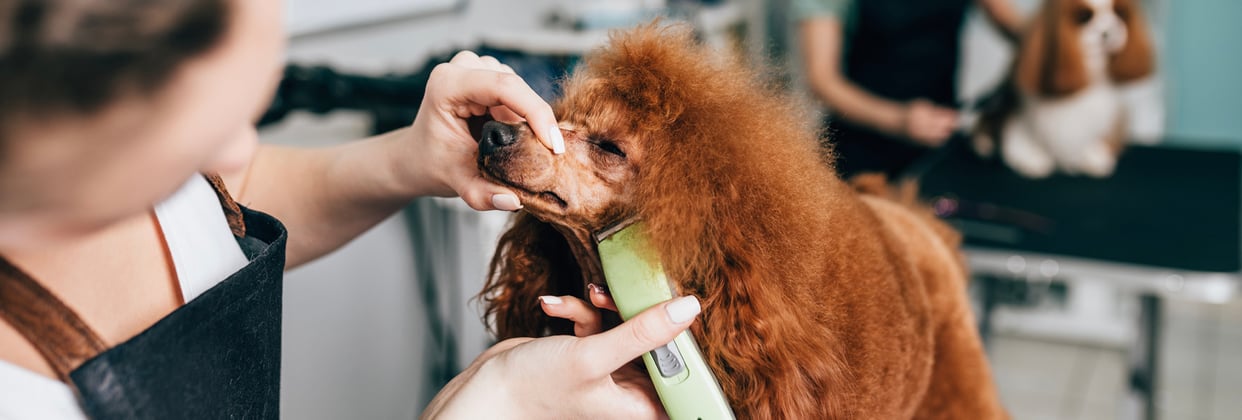

Exercise and mental stimulation.
How much exercise does a Poodle need?
Poodles are the athletes of the dog world - graceful, energetic, and always up for an adventure! Their exercise needs vary by size:
Standard Poodles: 60-90 minutes daily of active exercise
Miniature Poodles: 45-60 minutes daily
Toy Poodles: 30-45 minutes daily
But here's a top tip - Poodles need mental workouts as much as physical ones!
Consider:
Interactive puzzle toys
Training sessions
Agility courses
Scent work games
Swimming (they're natural water lovers!)
For creative ways to keep your Poodle mentally sharp, check out our guide to making your dog happy.
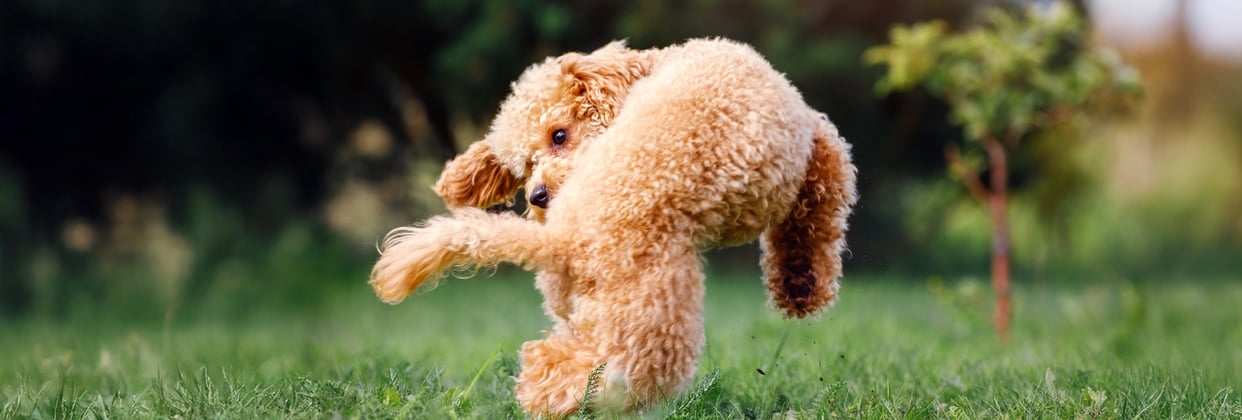

Feeding and nutrition.
Let's talk about keeping your Poodle happy and healthy from the inside out! These elegant dogs need quality nutrition to maintain their boundless energy and that gorgeous, continuously growing coat.
Here's a simple guide to daily feeding amounts, though remember - every Poodle is unique!
Standard Poodles:
2-3 cups of high-quality dry food daily, split into two meals.
Think of it as breakfast and dinner, just like us!
Miniature Poodles:
1-1.5 cups daily, divided into two meals.
Perfect portion control for these medium-sized sweethearts
Toy Poodles:
1/4-1/2 cup daily, divided into two meals
Small but mighty - they need proper nutrition, too!
Want to give your Poodle something special? Our members absolutely love Butternut Box - they deliver perfectly portioned, human-grade ingredients right to your door.
As a Waggel member, you'll get 50% off your first two boxes. Now that's something to wag about!
Common health issues.
While Poodles are generally robust and healthy, like all of us, they can face certain health challenges.
Let's look at what to watch out for based on recent veterinary data:
Hip dysplasia
Particularly common in Standard Poodles, this inherited condition affects mobility.
Treatment typically ranges from £3,000-£5,000, depending on severity. Early detection is key - regular check-ups can help catch it early.
Addison's disease
Poodles have a higher chance of developing this adrenal condition.
Initial diagnosis costs between £300-£500, with monthly treatment averaging £50-£200. Regular monitoring helps maintain quality of life.
Progressive retinal atrophy (PRA)
This inherited eye condition can affect vision. Early detection through genetic testing (£50-£300) is crucial.
While there's no cure, we can help affected dogs adapt brilliantly to changes in their vision.
Note: Costs are approximate and can vary based on location and specific veterinary practices.
For more detailed information about caring for your dog's health, check out our comprehensive guide to pet dental care - it's just one of many aspects of keeping your Poodle healthy!


Pet insurance for Poodles.
Your sophisticated Poodle deserves the very best care throughout their life.
At Waggel, we understand these intelligent companions have unique needs, which is why we offer tailored insurance coverage that grows with them.
As a Waggel member, you'll enjoy:
24/7 access to online vet care through Joii
Free behaviour and nutrition consultations with our expert, Junior
Monthly perks and discounts tailored for you and your Poodle
Comprehensive coverage for breed-specific conditions
Remember, while Poodles may look delicate and refined, they are incredibly adaptable dogs that can bring joy to almost any lifestyle when properly cared for, especially with the right dog food and training.
Whether you choose a Toy, Miniature, or Standard, you're gaining a loyal, brilliant, and loving companion who'll fill your life with elegance and affection for years to come.
Ready to protect your Poodle? Get your free quote today and join the Waggel family. We can't wait to meet your sophisticated new friend!
